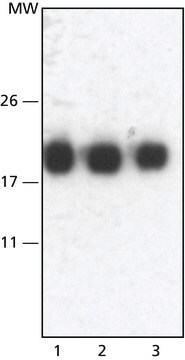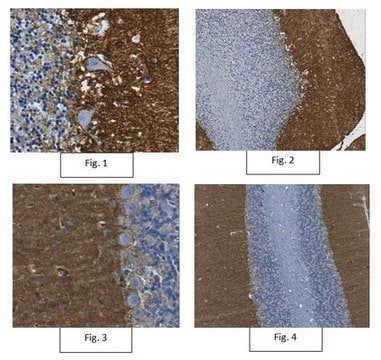SRP2083
WT-1 (-KTS) human
recombinant, expressed in insect cells, ≥60% (SDS-PAGE)
Synonyma:
AWT1, GUD, NPHS4, WAGR, WIT-2, WT33
Přihlásitk zobrazení cen stanovených pro organizaci a smluvních cen
About This Item
UNSPSC Code:
12352200
NACRES:
NA.77
Doporučené produkty
biological source
human
recombinant
expressed in insect cells
assay
≥60% (SDS-PAGE)
form
frozen liquid
mol wt
~55.6 kDa
packaging
pkg of 5 μg
storage condition
avoid repeated freeze/thaw cycles
concentration
250 μg/mL
color
clear colorless
NCBI accession no.
UniProt accession no.
shipped in
dry ice
storage temp.
−70°C
Gene Information
human ... WT1(7490)
General description
Wilms tumor 1 (WT1) is encoded by the gene mapped to human chromosome 11p13. The encoded protein is expressed at high levels in nephrons, but at low levels in gonads, visceral adipose tissue, mesothelium and bone marrow cells. In addition, it is also abundantly expressed in renal podocytes in adults and in parietal epithelial cells during early days.
Biochem/physiol Actions
WT-1, the product of Wilms′ tumor suppressor gene Wt1, is a nuclear protein with structural motifs characteristic of transcription factors, including four C-terminal zinc fingers. While different pre-mRNA processing could result in 16 isoforms of the protein, inclusion or exclusion of exon 5 and the three amino acids (KTS) between zinc fingers 3 and 4 largely affects the activity of WT1 protein. Such a complex post-transcriptional regulation, particularly in splicing, may represent a major regulatory mechanism for tumorigenesis of the Wilms′ tumor. WT1 (-KTS) appears to have different binding affinity to both DNA and RNA compared to the +KTS form.
Wilms tumor 1 (WT1) is involved in various vertebrate developmental processes such as cell differentiation and proliferation, apoptosis and regulation of epithelial/mesenchymal characteristics. It serves as a tumor suppressor gene but might also possess oncogenic property. The encoded protein regulates mRNA splicing and interactions between protein. It is associated with cancers and as well as kidney function. Mutations in the gene leads to Denys-Drash syndrome, resulting in renal and genitourinary tract abnormalities. Deletion in the germline WT1 gene causes Wilms′ tumor. This gene is highly expressed in a various types of cancers.
Physical form
Clear and colorless frozen liquid solution
Preparation Note
Use a manual defrost freezer and avoid repeated freeze-thaw cycles. While working, please keep sample on ice.
Storage Class
10 - Combustible liquids
wgk_germany
WGK 1
flash_point_f
Not applicable
flash_point_c
Not applicable
Vyberte jednu z posledních verzí:
Osvědčení o analýze (COA)
Lot/Batch Number
Nevidíte správnou verzi?
Potřebujete-li konkrétní verzi, můžete vyhledat daný certifikát podle čísla dávky nebo čísla šarže.
Již tento produkt vlastníte?
Dokumenty související s produkty, které jste v minulosti zakoupili, byly za účelem usnadnění shromážděny ve vaší Knihovně dokumentů.
D A Haber et al.
Science (New York, N.Y.), 262(5142), 2057-2059 (1993-12-24)
A human Wilms tumor cell line (RM1) was developed to test the tumor suppressor activity of WT1, a zinc finger transcription factor that is expressed in the developing human kidney and is mutationally inactivated in a subset of Wilms tumors.
The Role of WT1 in Embryonic Development and Normal Organ Homeostasis.
Wilm B and Mu?oz-Chapuli R
Methods in Molecular Biology, 1467, 23-39 (2016)
D A Haber et al.
Proceedings of the National Academy of Sciences of the United States of America, 88(21), 9618-9622 (1991-11-01)
The chromosome 11p13 Wilms tumor susceptibility gene WT1 appears to play a crucial role in regulating the proliferation and differentiation of nephroblasts and gonadal tissue. The WT1 gene consists of 10 exons, encoding a complex pattern of mRNA species: four
The CUG-translated WT1, not AUG-WT1, is an oncogene.
Lee K Y, et al.
Carcinogenesis, 38(12), 1228-1240 (2017)
J A Kreidberg et al.
Cell, 74(4), 679-691 (1993-08-27)
In humans, germline mutations of the WT-1 tumor suppressor gene are associated with both Wilms' tumors and urogenital malformations. To develop a model system for the molecular analysis of urogenital development, we introduced a mutation into the murine WT-1 tumor
Náš tým vědeckých pracovníků má zkušenosti ve všech oblastech výzkumu, včetně přírodních věd, materiálových věd, chemické syntézy, chromatografie, analytiky a mnoha dalších..
Obraťte se na technický servis.








